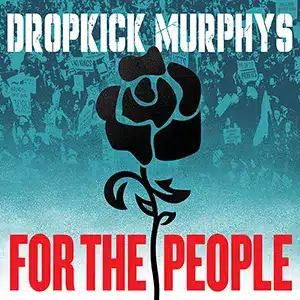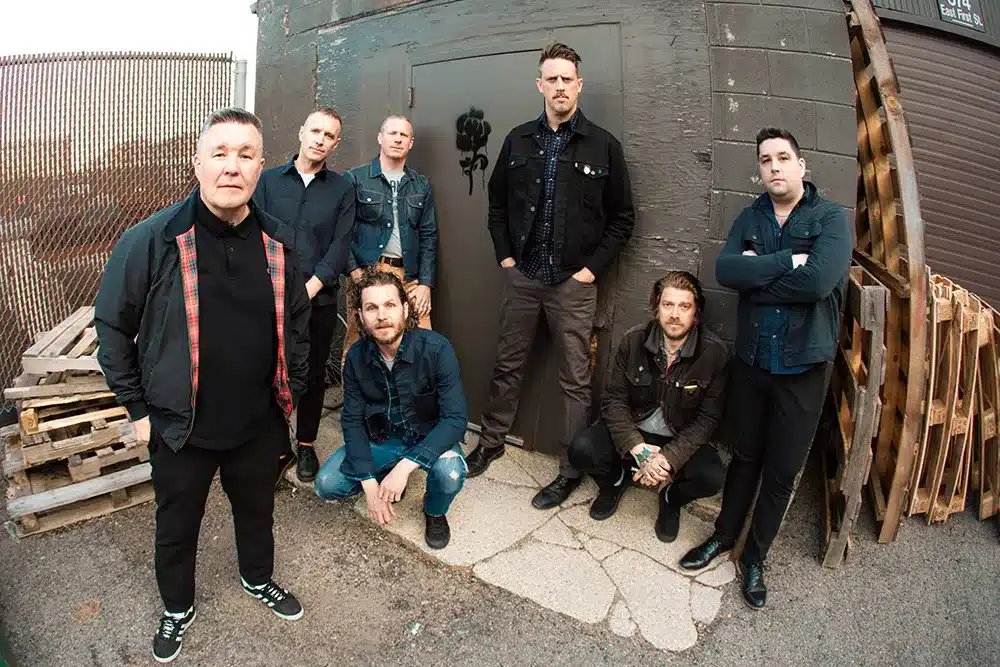
The Dropkick Murphys’ Ken Casey speaks about his trip to Ukraine, Trump, and the band’s decades-spanning career.
 For the People Dropkick Murphys Dummy Luck Music / Play It Again Sam 4 July 2025
For the People Dropkick Murphys Dummy Luck Music / Play It Again Sam 4 July 2025
Wartorn Ukraine might not be the first place you’d expect to find the Dropkick Murphys lead singer, Ken Casey, but that’s precisely where the Boston legend found himself this past summer. After dedicating considerable time, money, and merchandise sales to Ukraine’s ongoing humanitarian crisis amidst a brutal, decades-long conflict with Russia, Casey thought it was time to put his money where his mouth is, so to speak, and travel to Ukraine himself.
Speaking to PopMatters, Casey discussed Russia’s callous and ceaseless pursuit of control over the region, their unlawful targeting of ambulances and aid groups, and the wreckage they’ve sown under Putin’s quest for power. Casey’s aid group provided everything from bug spray to ambulances to toiletries sorely missing from the war’s front line. For all the cause célèbre, the war in Ukraine was afforded early in the latest heightening of the conflict, Casey says much of Ukraine feels forgotten by the West.

“When they see an American come over there,” Casey notes. “It has a very positive impact on their morale … They’re great people fighting a fight that could end up on our doorstep.”
Throughout his career, Casey has become acquainted with a myriad of rock groups in Ukraine. Whereas a few years ago they might have found themselves performing in the same kinds of venues as Casey and the Dropkick Murphys, instead they find themselves on the front lines of a deadly war against one of the most powerful militaries in the world.
Refreshingly, during our conversation over Zoom, Casey seemed less interested in hitting the standard-issue album rollout press points and more interested in discussing substantive social issues. For all his machismo and punk exterior, Casey comes across as almost impossibly earnest and community-minded.
Before we’d even had the chance to talk about the Dropkick Murphys’ new album, For the People, Ken was onto another favorite subject of his: Donald Trump (more specifically, his unbridled, flagrant hatred for our Despot in Chief). Recently, Casey and his band had something of a viral moment when a clip from their Clearwater, Florida show started making the rounds online. In the video, Casey, spotting somebody in the crowd sporting a MAGA t-shirt, calls the concertgoer out, presenting him with a wager.
Casey asks the man if he supports American workers, to which he emphatically responds that he does. Casey asks the man to check the tag on his shirt to see if the shirt was, in fact, made in America, offering the fan $100 if it is. Unlike Dropkick Murphys’ merchandise (which is all made in the US), the fan’s MAGA shirt was, unsurprisingly, manufactured overseas in Nicaragua. While Casey used this opportunity to highlight the flagrant hypocrisy of the MAGA movement, he was still unbelievably respectful to the fan, even going so far as to thank him for being a good sport about the bet.
For all the bluster Casey might find himself on the receiving end of from conservatives across the country, he is delightfully unconcerned with their opinions. With groups like Bob Vylan recently finding themselves having their US visas revoked following their controversial performance at this year’s Glastonbury festival, it wouldn’t be surprising that some artists might feel the need to temper their language, but not Casey.
“It just gets me fired up more.” Casey tells us about Trump’s dogmatic aim to crush any dissenting voices. The “wannabe king”, as Casey calls Trump, doesn’t intimidate Casey. “We need to speak up more. There’s strength in numbers. If people start to cave there, they’re surrendering for all of us.”
Historically, much of the Dropkick Murphys’ prior political activism has centered around strengthening labor unions—a preeminent fixture in the group’s hometown of Boston. When we asked Casey about these union groups (and their recent turn away from the Democratic Party as indicated by the Teamsters non-endorsement of either presidential candidate in the last election (the first time the group has not endorsed a Dem nominee in nearly 30 years) Casey, oddly enough, is friendly with the Teamsters president and has had some difficult conversations about this very topic with him. Teamsters, like the union’s president Sean M. O’Brien, seem to be falling for the kinds of culture war nonsense the right likes to weaponize to stoke undue hostilities among the working class.
“The left didn’t give us anything. So instead I’m going to stick my head in the lion’s mouth.” Casey tells us in reference to the working class’s jarring disillusionment with the Democratic Party. “One might have failed you, but one wants to kill you,” he summarizes. Casey understands this isn’t a war of political ideologies: it’s a war between the ruling and working classes.
Growing up in Boston, Casey witnessed firsthand some of these lifelong Democrats turning to Trump and his goons. He tells us, “I’ve lost a lot of friends. Losing friends over a guy who wouldn’t piss on you if you were on fire … a great wool has been pulled over a lot of people’s eyes. Suddenly I’m a radical because I think people should have healthcare and children should have free school lunches.”
By being an independent group not beholden to the whims and avarice of major labels, Casey is afforded a certain level of political freedom without undue risk to the group’s ability to produce music. While Casey can certainly respect that some artists might feel fear for speaking out against our nation’s domineering conservative dogma, that kind of fear only emboldens him to speak up for those who feel they aren’t able to.
The lilting, parochial ballads of Celtic music might not seem the most obvious genre to blend with punk’s trademark abrasiveness and pulsating energy, but the Dropkick Murphys have spent their decades-spanning career providing proof of concept for the unlikely symbiosis. In an interview from Warped Tour 2001 with the delightfully dorky music journalist Nardwaur, a young Casey explains the varying crowds the show can attract. Sometimes filled with people their grandparents’ age, there for some Celtic music, and others packed to the gills with a moshpit-loving crew of crust punks, the Dropkick Murphys draw a diverse clientele.
When we asked Casey about this kind of audience range, and whether he ever feels obligated to cater his performance to the genre his crowd seems to lean towards, he told us he doesn’t and that the crowds themselves always seem to find their own balance. On this strange symbiosis, Casey says, “The pit does its thing in the front but still respects that somebody’s grandfather might be there … It just all seems to work in this totally bizarre way that I’m so grateful for.”
It almost brings to mind the sort of wide-ranging fan base an artist like Dolly Parton might attract; her crowds composed of hillbillies and drag queens, each belting Parton’s lyrics with equal fervor and reverence. “People like being part of that strange mixture … it’s controlled chaos,” Casey says.
After nearly 30 years together, the Dropkick Murphys’ fanbase has grown up with the group. “There were people at our Quincy record release show that were literally within the first 20 fans we’ve ever had, and they’re still with us, and they’re bringing their kids, and soon enough, they might bring their grandkids. The whole thing has evolved because people think it’s a good message to introduce their kids to. Whether it’s from the political side or just music and lyrics that have depth, heart, and passion. In a world of pop music, parents want to introduce their kids to that because it’s a rarity.”
“It’s community and that’s what we have,” Case concludes. “When it goes beyond the music and into a community, they want their people to be a part of it.”


